
EcoHealth
Scope & Guideline
Bridging Ecology and Health for a Sustainable Future
Introduction
Aims and Scopes
- One Health Approach:
The journal focuses on the interconnectedness of human, animal, and environmental health, promoting interdisciplinary research that considers the complex interactions between these domains. - Zoonotic Disease Surveillance:
A significant portion of the research published in EcoHealth addresses the surveillance and management of zoonotic diseases, exploring their transmission dynamics, risk factors, and control measures. - Environmental Drivers of Health:
The journal emphasizes understanding how environmental changes, such as climate change and habitat destruction, influence disease emergence and public health outcomes. - Ecosystem Services and Human Well-being:
Research explores how ecosystem services contribute to human health and well-being, including studies on the impacts of biodiversity loss and conservation efforts. - Public Health Interventions:
EcoHealth publishes studies that evaluate public health interventions aimed at mitigating zoonotic disease risks and enhancing community resilience in the face of environmental changes.
Trending and Emerging
- Impact of Climate Change on Health:
There is an increasing focus on how climate change affects the transmission dynamics of zoonotic diseases, highlighting the importance of adapting public health strategies in response to environmental changes. - Urban Wildlife and Disease Dynamics:
Research examining the interactions between urban wildlife and zoonotic diseases is gaining traction, as urbanization presents unique challenges for disease management and public health. - Mental Health and Environmental Stressors:
Emerging studies are beginning to explore the links between environmental stressors, such as climate change and biodiversity loss, and mental health outcomes, reflecting a growing recognition of the psychosocial dimensions of health. - Antimicrobial Resistance in Wildlife:
There is a rising interest in the role of wildlife in the emergence and spread of antimicrobial resistance, with studies investigating the ecological factors that contribute to this phenomenon. - Community-Based Health Initiatives:
The journal is increasingly publishing research that emphasizes community engagement and local knowledge in health interventions, acknowledging the importance of participatory approaches in addressing health risks.
Declining or Waning
- Traditional Infectious Disease Studies:
There seems to be a waning focus on traditional infectious diseases, as the journal increasingly emphasizes emerging zoonoses and the ecological context of disease emergence. - Human-Centric Health Studies:
Research solely centered on human health outcomes, without a comprehensive view of environmental or wildlife factors, is becoming less frequent, reflecting a shift towards more integrated approaches. - Studies Lacking Ecological Context:
Papers that do not incorporate ecological or environmental variables are appearing less often, indicating a preference for research that contextualizes health outcomes within broader ecological systems.
Similar Journals

Earth Systems and Environment
Innovating Solutions for Earth’s Environmental ChallengesEarth Systems and Environment, published by Springer International Publishing AG, is a leading peer-reviewed journal dedicated to the multidisciplinary study of natural and anthropogenic processes that shape the Earth's systems. With an impressive impact factor and consistently ranked in the Q1 category across various fields, including Computers in Earth Sciences, Economic Geology, and Environmental Science, it stands as a premier platform for researchers and professionals seeking to address pressing environmental challenges. The journal covers a wide spectrum of topics, from geology to global change, and emphasizes innovative methodologies and interdisciplinary approaches to understand and manage Earth systems. As an essential resource for scholars and practitioners, Earth Systems and Environment commits to excellence and facilitates open dialogue on critical issues affecting our planet.
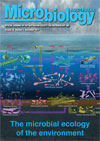
Microbiology Australia
Innovating Insights into Australia’s Microbial LandscapeMicrobiology Australia is a prominent journal published by CSIRO PUBLISHING, focusing on the diverse and rapidly evolving field of microbiology. Since its transition to Open Access in 2021, it has broadened its accessibility, fostering greater dissemination of research findings among scholars and practitioners. The journal features a range of topics that are pivotal for understanding microbial systems in applied microbiology, medical microbiology, public health, and environmental applications. Despite its current categorization in the Q4 quartile across several categories, it remains an essential platform for emerging research and innovative methodologies. Researchers and professionals can benefit from the journal's commitment to enriching the global discourse on microbiological advancements. With its ISSN 1324-4272 and E-ISSN 2201-9189, Microbiology Australia caters to a wide audience in Australia and beyond, making significant strides in bridging the gap between research and practical applications in microbiology.

Environmental Research Letters
Driving discourse on global ecological challenges.Environmental Research Letters is a premier, peer-reviewed journal published by IOP Publishing Ltd based in the United Kingdom, dedicated to advancing the field of environmental science. With an impressive Impact Factor and consistently ranked in the Q1 category for its focus on Environmental Science, Public Health, and Renewable Energy, this open-access journal has been a vital resource for researchers and practitioners since its inception in 2006. Covering a wide scope of topics including sustainability, environmental health, and innovative energy solutions, ERL aims to promote discourse and disseminate groundbreaking research that addresses global environmental challenges. As a leader in the field, it holds prestigious positions in Scopus rankings, ensuring that published works reach a wide audience, thus driving impactful change. Researchers, professionals, and students alike will find valuable insights and essential knowledge within its pages, making it a keystone publication for anyone invested in environmental advancements.
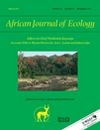
AFRICAN JOURNAL OF ECOLOGY
Unveiling the Secrets of African EcosystemsThe African Journal of Ecology, published by Wiley, is a leading academic journal in the field of Ecology, Evolution, Behavior, and Systematics. Established in 1963 and continuing its vital contributions to the field until 2024, this journal serves as a premier platform for researchers and scholars to share groundbreaking studies that explore the intricate relationships within ecosystems, particularly in the African context. With an impressive Scopus Rank of #423 out of 721 and a Q3 Quartile ranking, it stands as a credible source of scholarly information, gaining recognition among peers for its rigorous peer-review process and impactful publications. While the journal is not open access, it remains influential in driving advancements in ecological research and providing insights vital for conservation efforts and biodiversity studies. Authors and readers alike will find that the African Journal of Ecology not only promotes scientific inquiry but also fosters a deeper understanding of ecological dynamics that affect our world.

China CDC Weekly
Leading the discourse in public health innovation and practice.China CDC Weekly is an esteemed academic journal published by the Chinese Center for Disease Control and Prevention, dedicated to disseminating critical research in the fields of epidemiology, infectious diseases, and public health. Since its inception in 2019, the journal has rapidly established itself as a key resource for scholars, professionals, and students, achieving notable rankings, including Q2 in Epidemiology and Infectious Diseases, and Q1 in Public Health, Environmental, and Occupational Health for 2023. With an emphasis on the latest advancements and data-driven insights, China CDC Weekly offers a platform for researchers to contribute to the vital discourse surrounding health policies, disease control, and public safety in a rapidly evolving global landscape. As an open-access journal, it ensures widespread availability and visibility of research findings, reflecting its commitment to advancing public health knowledge in China and beyond. The conference years from 2019 to 2024 further highlight its responsiveness to emerging health challenges and trends, positioning the journal as a preeminent publication for interdisciplinary collaboration and innovation.

BMC Veterinary Research
Inspiring collaboration for a healthier future in veterinary care.BMC Veterinary Research, published by BMC in the United Kingdom, stands as a pivotal open-access platform dedicated to advancing the field of veterinary science since its inception in 2005. With an impressive impact factor that reflects its influential presence, this journal has achieved a remarkable ranking of #17 out of 194 in the Scopus Veterinary category, placing it in the 91st percentile among its peers. The journal serves as an essential resource for researchers, professionals, and students alike, fostering the dissemination of high-quality research and innovative practices within the veterinary and broader medical communities. With its commitment to open access, BMC Veterinary Research ensures that valuable insights are accessible to all, promoting collaboration and knowledge sharing that drive the advancement of veterinary sciences. As it continues to publish significant findings until 2024, it remains a key contributor to the contemporary discourse on animal health and welfare.
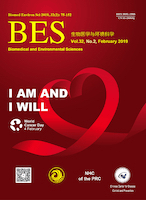
BIOMEDICAL AND ENVIRONMENTAL SCIENCES
Shaping Public Health Through Interdisciplinary Insights.Biomedical and Environmental Sciences is a distinguished peer-reviewed journal dedicated to the advancement of knowledge in the fields of health, toxicology, public health, and environmental sciences. Published by the Chinese Center for Disease Control & Prevention, this journal has been a vital platform for researchers and professionals since its inception in 1988, contributing to interdisciplinary discussions and the dissemination of pertinent research findings up to the current year, 2024. With an ISSN of 0895-3988 and an E-ISSN of 2214-0190, it holds a respectable position in the Q3 category for both Health, Toxicology and Mutagenesis, and Public Health, Environmental and Occupational Health, indicating its relevance and contribution to these significant domains. Although this journal does not offer open access, it remains an essential resource for anyone interested in understanding the intricate interplay between biomedical research and environmental health challenges. As it continues to navigate the complexities of contemporary health issues, Biomedical and Environmental Sciences is poised to facilitate vital discussions and innovations in the pursuit of improved public health outcomes globally.
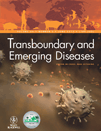
Transboundary and Emerging Diseases
Unveiling new insights into global health challenges.Welcome to Transboundary and Emerging Diseases, a prestigious journal published by WILEY-HINDAWI. With its ISSN of 1865-1674 and E-ISSN of 1865-1682, this journal plays a pivotal role in the dissemination of high-quality research within the fields of Immunology, Microbiology, Medicine, and Veterinary Sciences. Based in the United Kingdom, this open-access journal stands out with a remarkable impact factor, reflecting its category quartiles in 2023, where it secured Q1 rankings across multiple disciplines, including a remarkable rank of #3 out of 194 in Veterinary General, placing it in the top 2% of its field. With coverage spanning from 2008 to 2024, Transboundary and Emerging Diseases provides a vital platform for researchers, professionals, and students to explore emerging threats to global health and animal welfare. The journal's commitment to open access ensures broad availability of cutting-edge research, fostering collaboration and knowledge sharing in pursuit of innovative solutions to transboundary diseases. Join a community dedicated to advancing the science and practice within this crucial area of study.
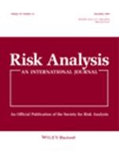
RISK ANALYSIS
Illuminating the Path to Safer Engineering and PhysiologyRISK ANALYSIS is a premier journal published by Wiley, focusing on the critical intersection of safety, risk, reliability, and quality within the fields of engineering and physiology. With a strong standing reflected in its Q1 category ranking in Safety, Risk, Reliability and Quality and Q2 in Physiology (medical), this journal is a vital resource for researchers, professionals, and students eager to stay informed on the latest methodologies, theories, and applications surrounding risk assessment and management. Since its inception in 1981, RISK ANALYSIS has been instrumental in shaping the discourse in its fields, garnering a robust reputation verified by its high rankings on Scopus, where it is positioned in the 85th percentile in Safety and the 77th percentile in Medicine. Though it does not currently offer Open Access options, the journal remains essential for those committed to advancing their understanding of risks associated with complex systems. For more insights, RISK ANALYSIS is available to readers throughout its converged years extending to 2024, solidifying its role as a foundational journal for impactful research.

Tropical Medicine and Infectious Disease
Bridging science and care for infectious diseases.Tropical Medicine and Infectious Disease, published by MDPI, is a leading peer-reviewed journal dedicated to advancing the field of tropical medicine and infectious diseases. With an open access model established since 2016, this journal fosters a collaborative environment for researchers, professionals, and students from around the world to disseminate cutting-edge findings and innovative approaches to public health challenges, particularly in tropical regions. The journal has earned recognition, achieving a Q2 quartile ranking in notable fields including Immunology and Microbiology, Infectious Diseases, and Public Health, Environmental, and Occupational Health in 2023, indicative of its influence and relevance in the scientific community. With a focus on high-quality research, Tropical Medicine and Infectious Disease aims to bridge the gap between basic science and clinical application, providing invaluable insights critical for combating infectious diseases and improving health outcomes in vulnerable populations. The journal’s accessibility and substantial indexing in major databases further solidify its importance as a key platform for impactful research in this essential field.